Democratic practices and participatory culture must be revived within the political parties in order to achieve transparent and stable democratic governance in Bangladesh.
Good political leadership and democratised state institutions are of paramount importance to do away with the culture of confrontational politics, corruption and other malfunctions prevailing since the restoration of electoral democracy in the 1990s.
The deliberations emanated from a CPD dialogue on the study titled “Political Parties and Democracy in Bangladesh,” held at BRAC Centre Inn Auditorium on Saturday, 17 May 2014.

CPD Chairman Professor Rehman Sobhan and Executive Director Professor Mustafizur Rahman, in their addresses, mentioned that the study particularly focused on the state of democracy and intra-party democratic practices in Bangladesh, with recommendation towards how undemocratic practices could be democratised.
In her keynote presentation, CPD Distinguished Fellow Professor Rounaq Jahan drew upon the evolution of political parties in Bangladesh and the challenges that impeded democratic practices. According to Professor Jahan, the major challenges include failure in establishing post-election democratic governance, the tradition of dynastic ruling, criminalisation of politics through the emergence of political muscleman, clientelism and illegitimate funding sources; rising inter and intra-party feud; absence of ideals and erosion of intra-party democratic practices.
[box title=”Resources” color=”#333333″]Keynote presentation on Political Parties and Democracy in BangladeshPress reports on the event[/box]
Chief Guest Mr Tofail Ahmed, MP, Hon’ble Minister for Commerce, Government of Bangladesh underscored that the scope for emerging youth leadership has been undermined in Bangladesh politics. He also emphasised that good political leadership must develop from the grassroots-level and this requires participatory politics – a culture slowly perishing away.
Echoing similar concerns, Special Guest Barrister Moudud Ahmed, Member of National Standing Committee of Bangladesh Nationalist Party, opined that the future of Bangladesh largely hinges on devolution of power and the two major leaders’ political will to return to democratic values and practices.
Barrister Anisul Islam Mahmud, MP, Hon’ble Minister for Water Resources, Government of Bangladesh, also a Special Guest at the programme, pointed out that ensuring proportional representation with functioning democratic practices; holding secret ballot while electing leaders at all levels and refraining from boycotting the Parliament could lead towards the way out of one-man-centric politics.
Among the designated discussants, Professor Imtiaz Ahmed of Department of International Relations, University of Dhaka, argued that good governance could be restored through dissolution of the politics-business nexus that is profitable for a vested quarter in Bangladesh.
Political activism should be in line with the Representation of the People Order (RPO), suggested another discussant Dr Badiul Alam Majumder, Member Secretary of SHUJAN. Promoting honest and qualified candidates for nominations and getting rid of people enjoying impunity due to their political alliance would restore democratic culture, he added.
During the floor discussion, more invaluable observations emerged from Ms Shirin Akhter, MP, Member of Parliamentary Standing Committee on Ministry of Labour and Employment; Ambassador Mr Shamsher Mobin Chowdhury, BNP Vice Chairman; Mr Amir Khosru Mahmud Chowdhury and Mr Enam Ahmed Chowdhury, both Member(s) of Advisory Council of the BNP Chairperson; Former Chief Election Commissioners Dr A T M Shamsul Huda and Brig. Gen. (Retd) Sakhawat Hussain; Mr M Hafizuddin Khan, TIB Board of Trustees Member and Former Advisor to the Caretaker Government; Ambassador Munshi Faiz Ahmad, Chairman, Bangladesh Institute of International and Strategic Studies (BIISS); Dr Wajedul Islam Khan, General Secretary, Bangladesh Trade Union Kendra; Dr Binayak Sen, Research Director, Bangladesh Institute of Development Studies (BIDS); Mr Mohammad Jahangir, Executive Director, Centre for Development & Communication; Mr S M Akram, Former Member of Parliament; Ms Munira Khan, Former Member, Human Rights Commission; and Mr M Syeduzzaman, Member, CPD Board of Trustees, among others.



